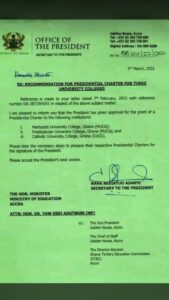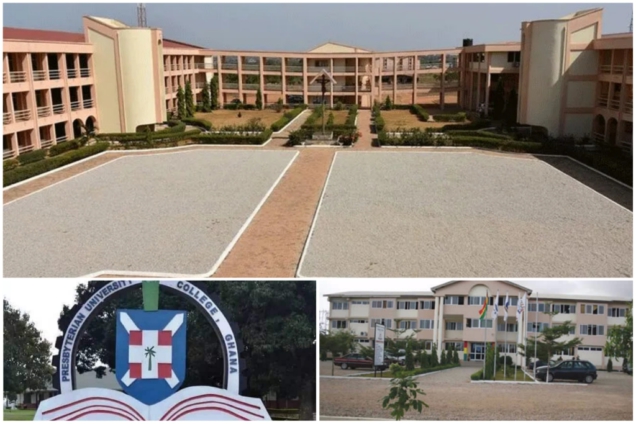Ghana’s President Nana Dankwa Akufo-Addo has granted a Presidential Charter three Faith-Based University Colleges in the West African country.
In a letter dated March 3, Nana Bediatuo Asante, Secretary to the President said, “I am pleased to inform you that the President has given approval for the grant of a presidential charter to the Methodist University College, Ghana (MUCG); the Presbyterian University College, Ghana (PUCG) and the Catholic University College, Ghana (CUCG).”
The Letter urged the Ministry of Education to “please take the necessary steps to prepare their respective Presidential Charters for the signature of the President”.

The three private university colleges, incidentally all faith-based met the criteria of the Ghana Tertiary Education Commission (GTEC) for a Presidential Charter.
With the granting of the Charter, the three University Colleges have transitioned into autonomous universities with the capacity to award their own degrees and diplomas, and will now be known as Methodist University at Dansoman in the Greater Accra Region; Presbyterian University at Abetifi in the Eastern Region and Catholic University at Fiapre in the Bono Region.
They are the fourth, fifth and six colleges to be given a presidential charter under the Akufo-Addo administration, following Ashesi University in 2018 and the Pentecost University College in Accra and the All Nations University College in Koforidua in 2020.
A “Chartered” institution implies one that has been granted certain rights and privileges by the President of the Republic of Ghana or the Legislature of a country to operate as an autonomous degree granting institution. The status is granted after a careful scrutiny of the institution’s statutes, examination procedures, quality assurance standards and others.
In 2019, during a courtesy visit to President Akufo-Addo, the Ghana Catholic Bishops’ Conference (GCBC) presented a petition requesting for the Presidential Charter to the Catholic University College of Ghana.

“Your Excellency, we will appreciate it very much if you could kindly grant our University a Presidential Charter for it to be an independent degree-awarding institution,” the President of the GCBC, Archbishop Philip Naameh, said during their visit at the Flagstaff House in Accra.
He continued, “The University College is ripe to be granted a Presidential Charter, in order to improve upon its facilities.”
“There is the need for the university to ensure excellence by building stake-holder confidence, creating a conducive academic atmosphere and increasing academic programmes,” the Archbishop said on behalf of his brother Bishops in 2019.
In June 2018 during the 20th Anniversary celebration of the Holy Spirit Catholic Church at Nkwabeng attended by President Akufo-Addo, Bishop Mathew Kwasi Gyamfi of Sunyani, appealed to the President of Ghana to grant the Presidential Charter.
In October 2017, the President of the Presbyterian University College in Ghana, Prof. Emmanuel Adow Obeng had petitioned the Government to consider granting Private Universities “that have gone through successful mentorship for ten to fifteen years Automatic Charter Status to help reduce the financial burden on Private Universities.”
On October 31, 2020, President Akufo-Addo reportedly assured the authorities of the Catholic University College that the school would be granted a presidential charter to make it autonomous.

The Bono Regional Minister, Evelyn Kumi Richardson gave the assurances when he spoke on behalf of the President during the 19th and 29th Matriculation of the university college.
In the address, Ghana’s President noted that the Catholic University College of Ghana has “Come of age and needs to be granted a Presidential Charter to run as an autonomous institution.”
“As you may be aware, this government is taking steps to accelerate the grant of the Presidential Charter to private Universities because of your contribution to education and learning in the country. As a private University College, you have indeed gone through your minimum required period of academic mentorship and are under the supervision of at least two major mentoring public institutions for the award of degrees and diplomas,” he said.
By Damian Avevor




